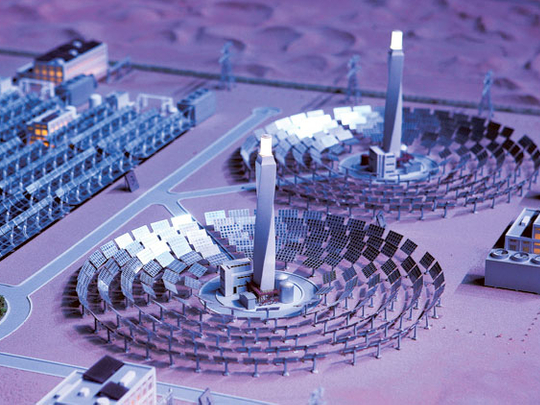
Dubai: The regulations to govern solar power connection in Dubai homes and businesses are in the final stages of development, a top official said on Sunday.
Dubai aims to feed more solar power into its main grid – currently heavily dependent on gas-fired turbines – as part of its strategy to diversify resources. Once this happens, the cost of electricity for homes may be reduced considerably but it will be finalised once the system is ready to use.
Solar power will help meet the city’s power demand while turning it further away from non-renewable energy sources.
Sunlight or solar radiation is abundant in the clear skies of the UAE and is increasingly being harnessed for conversion into electricity.
In the coming 16 years, Dubai aims to reduce gas use to 71 per cent, and mix its energy sources by depending 12 per cent on nuclear energy, 12 per cent on clean coal and five per cent on solar power.
The target is part of the Dubai Integrated Energy Strategy 2030.
On Sunday, Saeed Mohammad Al Tayer, CEO of Dubai Electricity and Water Authority (Dewa), said the resolutions and laws regarding connecting homes and commercial facilities to solar power are being finalised.
“We’re completing the draft of the laws, they are in the final stages,” Al Tayer said.
His comments came on the sidelines of the launch of the Emirates Energy Award 2014-15 on Sunday.
More than 20 megawatts (MW) of electricity are already sourced through two solar power installations linked to the main network, he said.
In August, Dewa released a tender for the 100 MW-Phase II of the Mohammad Bin Rashid Al Maktoum Solar Park – a 1,000MW project to power 200,000 homes by 2030.
Besides the solar park, Dewa is expected to produce local demand for rooftop solar panels for homes and businesses for domestic energy needs, according to The Report 2014 Dubai by Oxford Business Group.
The report added that the cost of photovoltaic technology in Dubai could “drop to par” before the next decade.
Al Tayer said once the regulations are in place, “it will encourage people to install solar energy. This is the plan of the [Dubai] government”.
He added: “Of course, we in Dewa have the technical issues, specifications and designs. We’ll connect [solar] to the distribution network; the safety (consideration) has to be in place.”












